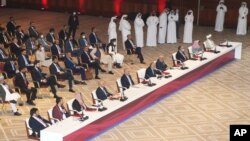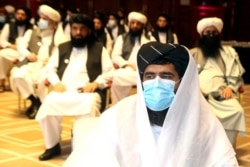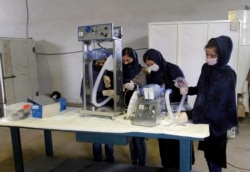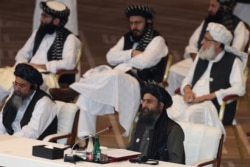While the Afghan government and the Taliban continue their negotiation efforts to reach a peace agreement, women’s rights activists in Afghanistan say they are increasingly concerned that the talks, dominated by men, could lead to a decrease in their rights and freedoms gained since 2001.
After months of delay, representatives of the Afghan government and the Taliban gathered on Sept. 12 in Doha, Qatar, to begin negotiations to end 19 years of Afghanistan’s bloodshed.
Of the 21 government negotiators, only four are women. There are no female participants among the 21 representatives of the Taliban in the Doha talks.
The four women will be asked to defend nearly two decades of women’s rights advances in Afghanistan during the next round of talks, of which the date and format are still being discussed.
“We will be representing the people of Afghanistan, especially the women,” Fawzia Koofi, one of the women negotiators, told VOA.
Koofi, who escaped an assassination attempt by unidentified gunmen less than a month before the start of the talks, did not give details on Kabul’s plans to push back against Taliban’s notorious gender rules but said women’s rights were a “red line” for them.
Another female representative, Habiba Sorabi, said she is optimistic that some of the improvements women have achieved over the years are irreversible but is concerned that the Taliban could impose some of its misogynistic beliefs.
“It is not only me, but all Afghans are worried,” Sorabi said.
She said the male government negotiators have assured her of their commitment to protecting women’s rights. However, she said she was uncertain that “everything will be 100% the same as it is now,” given the insurgent group’s history of discrimination and assaults on women.
Under Taliban rule, women in Afghanistan were denied basic rights to education and employment and subjected to violence, such as public lashings and executions by stoning. The militants also forced women to cover themselves from head to foot and prevented women from leaving their houses without a male companion.
These restrictions on women were lifted in 2001 after the U.S. toppled the Taliban regime and the new Afghan government began introducing more laws favorable to women.
3.5 million girls in school
According to the Afghan Ministry of Education, girls account for 3.5 million of the roughly 9 million students currently going to schools. Additionally, women make up about one-third, or 100,000, of the university students in Afghanistan.
Government data shows that 30% of civil servant jobs are now held by women. Women also hold about a quarter – 28% – of parliamentary seats.
Despite progress, some women’s rights activists say the Afghan government has failed to take bolder actions that guarantee full equality for women. The activists are particularly concerned that Kabul disregarded repeated calls for women to have full participation in the peace process.
“Full negotiation means not only present at the table but present at the table in a number that represents their portion of the population,” Heather Barr, a senior researcher for women’s rights in Asia for Human Rights Watch, told VOA.
Zalmay Khalilzad, the U.S. envoy for Afghanistan, has said that the four women have to be “fully prepared” to defend women’s rights.
While stressing that the four women negotiators will do their best to defend women’s rights, Barr said, “This is not a fair expectation of them, and it is not fair to the women of Afghanistan.”
A report last month by Oxfam, a global humanitarian organization, found that Afghan women participated in only 15 of 67 formal or informal peace meetings since 2005.
Women among Taliban
Annie Pforzheimer, a nonresident associate with the Washington-based Center for Strategic and International Studies (CSIS), told VOA that many expected that the Taliban would include women in their delegation to Doha to show their willingness to adjust to new realities.
“Unfortunately, ... it shows that they [Taliban] have not made an adjustment to what Afghanistan is right now,” Pforzheimer said.
Speculation that the Taliban might include female representatives in its negotiations with the Afghan government began in April 2019, when the group’s spokesman, Zabiullah Mujahid, in a tweet announced that they had no objection to the participation of women in intra-Afghan talks
At the leadership level, the Taliban have claimed their position on women’s rights has changed from that of the 1990s. Human Rights Watch in its June report, however, said that the Islamists continue with their extreme restrictions in the areas they control.
Many Afghan women activists agree the group is far from reforming its approach of violence against women.
The women fear the Taliban could start a campaign of targeted assassinations against women’s rights activists to force them into silence, according to a female journalist in the northern province of Baghlan who wished to be identified by her pseudonym, Walwala, due to her fear of being targeted by the insurgents.
“We are not feeling safe right now. If a woman is attacked in any corner of Afghanistan, it will make us think that it can happen to any one of us,” the 23-year-old journalist told VOA. “I am really worried that I might not be able to continue working as a journalist.”
In a statement on Sept. 17, the U.S. Embassy in Kabul warned that extremist groups were planning attacks on a “variety of targets,” including female activists and Afghan employees.
The warning came as the Afghanistan Independent Human Rights Commission (AIHRC) reported an increase in targeted assaults in the first six months of 2020. The report said 533 people were killed and 412 were injured “in systematic and targeted assassinations.”
Shukria Barakzai, a former parliamentarian who ran an underground school for girls in Kabul during the Taliban rule, said the militant group would likely attempt to push back against some basic rights for women, especially on their freedom of movement, when new talks are held.
“They have not changed. They want women to stay at home,” Barakzai told VOA, adding that the Afghan women are ready to fight back.
“The Taliban will not be able to impose their government on the people. Today’s Afghanistan is different from what it was in the 1990s when the Taliban were able to rule by force,” she said.







